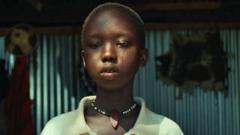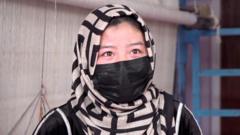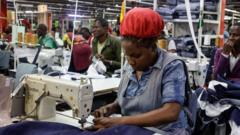In a groundbreaking film, teenage actress Michelle Lemuya Ikeny tackles the issue of child marriage, communicating its devastating effects in her community in Turkana, Kenya. The film has sparked conversations on this critical subject, highlighting not only her personal journey but also the wider implications for girls in sub-Saharan Africa.
Young Actress Takes a Stand Against Child Marriage Through Film

Young Actress Takes a Stand Against Child Marriage Through Film
Michelle Lemuya Ikeny, a 15-year-old actress, inspires change with her portrayal of a girl escaping child marriage in Kenya.
In a remarkable representation of her homeland, 15-year-old actress Michelle Lemuya Ikeny is using her role in a film to highlight the devastating issue of child marriage. Set in the Turkana region of north-western Kenya, this coming-of-age story follows the journey of 13-year-old Nawi, who is sold by her father to an older, wealthy man for cattle and goats. By bringing this narrative to the forefront, Ikeny hopes to provoke discussions about a topic that is often shunned by her community.
"I want the movie to spark conversations about this topic, because it's really not something people want to talk about," Ikeny told the BBC, reflecting on her desire to raise awareness. Growing up in Turkana, she has witnessed many of her peers forced to abandon education after being married off, often due to dowry payments. Her powerful portrayal of Nawi earned her the Africa Movie Academy Award for best promising actor last November, despite her lack of previous acting experience.
The film not only captures Nawi's fight for freedom and education but also delves deep into the cultural acceptance of child marriage in Kenya, where one in four girls marry before the age of 18, according to the UN. In a pivotal scene, after achieving top marks in her exams, Nawi learns of her impending marriage. Refusing to accept her fate, she devises a clever escape plan and heads to Nairobi to pursue her dream of education.
Written by Milcah Cherotich, who draws from her own life experiences, the film resonates personally as she recounts her sister’s forced marriage at 14 and the tragic consequences that followed. Despite facing potential backlash for addressing such sensitive issues, Cherotich believes in the transformative power of storytelling.
With child marriage a pressing issue not just in Kenya, but also across sub-Saharan Africa—where girls are at significant risk—both filmmakers aim to shed light on this urgent social challenge. Educational initiatives accompanying the film, such as the establishment of a new school for girls in Turkana, emphasize the community's embrace of change.
As Ikeny and her team continue to promote “Nawi” across various platforms—including international screenings—the hope is that its message will resonate widely. "When you watch the movie, try to put yourself in the shoes of Nawi," encourages Ikeny, highlighting the dreams and aspirations of countless girls stifled by the chains of child marriage.





















